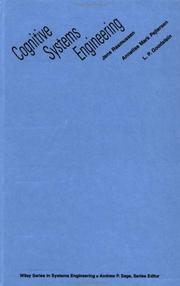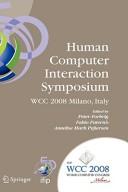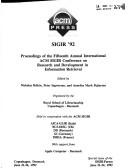| Listing 1 - 10 of 10 |
Sort by
|
Book
Year: 1989 Publisher: Roskilde Risø National Laboratory
Abstract | Keywords | Export | Availability | Bookmark
 Loading...
Loading...Choose an application
- Reference Manager
- EndNote
- RefWorks (Direct export to RefWorks)
Book
ISBN: 3642152309 3642152317 Year: 2010 Publisher: New York : Springer,
Abstract | Keywords | Export | Availability | Bookmark
 Loading...
Loading...Choose an application
- Reference Manager
- EndNote
- RefWorks (Direct export to RefWorks)
The IFIP World Computer Congress (WCC) is one of the most important conferences in the area of computer science at the worldwide level and it has a federated structure, which takes into account the rapidly growing and expanding interests in this area. Informatics is rapidly changing and becoming more and more connected to a number of human and social science disciplines. Human–computer interaction is now a mature and still dynamically evolving part of this area, which is represented in IFIP by the Technical Committee 13 on HCI. In this WCC edition it was interesting and useful to have again a Symposium on Human–Computer Interaction in order to p- sent and discuss a number of contributions in this field. There has been increasing awareness among designers of interactive systems of the importance of designing for usability, but we are still far from having products that are really usable, and usability can mean different things depending on the app- cation domain. We are all aware that too many users of current technology often feel frustrated because computer systems are not compatible with their abilities and needs in existing work practices. As designers of tomorrow’s technology, we have the - sponsibility of creating computer artifacts that would permit better user experience with the various computing devices, so that users may enjoy more satisfying expe- ences with information and communications technologies.
Engineering & Applied Sciences --- Computer Science --- Human-computer interaction --- Computer science. --- Computer communication systems. --- User interfaces (Computer systems). --- Artificial intelligence. --- Application software. --- Computer engineering. --- Computer Science. --- Computer Engineering. --- Computer Communication Networks. --- Computer Applications. --- Information Systems Applications (incl. Internet). --- User Interfaces and Human Computer Interaction. --- Artificial Intelligence (incl. Robotics). --- Artificial Intelligence. --- AI (Artificial intelligence) --- Artificial thinking --- Electronic brains --- Intellectronics --- Intelligence, Artificial --- Intelligent machines --- Machine intelligence --- Thinking, Artificial --- Bionics --- Cognitive science --- Digital computer simulation --- Electronic data processing --- Logic machines --- Machine theory --- Self-organizing systems --- Simulation methods --- Fifth generation computers --- Neural computers --- Informatics --- Science --- Interfaces, User (Computer systems) --- Human-machine systems --- Application computer programs --- Application computer software --- Applications software --- Apps (Computer software) --- Computer software --- Communication systems, Computer --- Computer communication systems --- Data networks, Computer --- ECNs (Electronic communication networks) --- Electronic communication networks --- Networks, Computer --- Teleprocessing networks --- Data transmission systems --- Digital communications --- Electronic systems --- Information networks --- Telecommunication --- Cyberinfrastructure --- Network computers --- Computers --- Distributed processing --- Design and construction
Digital
ISBN: 9780387096780 Year: 2008 Publisher: Boston, MA Springer Science+Business Media, LLC
Abstract | Keywords | Export | Availability | Bookmark
 Loading...
Loading...Choose an application
- Reference Manager
- EndNote
- RefWorks (Direct export to RefWorks)
Book
ISBN: 8755015379 Year: 1989 Publisher: Roskilde Risø National Laboratory
Abstract | Keywords | Export | Availability | Bookmark
 Loading...
Loading...Choose an application
- Reference Manager
- EndNote
- RefWorks (Direct export to RefWorks)
Digital
ISBN: 9783642152313 9783642422898 9783642152320 9783642152306 Year: 2010 Publisher: Berlin, Heidelberg Springer
Abstract | Keywords | Export | Availability | Bookmark
 Loading...
Loading...Choose an application
- Reference Manager
- EndNote
- RefWorks (Direct export to RefWorks)
The IFIP World Computer Congress (WCC) is one of the most important conferences in the area of computer science at the worldwide level and it has a federated structure, which takes into account the rapidly growing and expanding interests in this area. Informatics is rapidly changing and becoming more and more connected to a number of human and social science disciplines. Human–computer interaction is now a mature and still dynamically evolving part of this area, which is represented in IFIP by the Technical Committee 13 on HCI. In this WCC edition it was interesting and useful to have again a Symposium on Human–Computer Interaction in order to p- sent and discuss a number of contributions in this field. There has been increasing awareness among designers of interactive systems of the importance of designing for usability, but we are still far from having products that are really usable, and usability can mean different things depending on the app- cation domain. We are all aware that too many users of current technology often feel frustrated because computer systems are not compatible with their abilities and needs in existing work practices. As designers of tomorrow’s technology, we have the - sponsibility of creating computer artifacts that would permit better user experience with the various computing devices, so that users may enjoy more satisfying expe- ences with information and communications technologies.
Programming --- Computer architecture. Operating systems --- Information systems --- Artificial intelligence. Robotics. Simulation. Graphics --- Computer. Automation --- applicatiebeheer --- apps --- informatica --- informatiesystemen --- KI (kunstmatige intelligentie) --- computernetwerken --- architectuur (informatica) --- interfaces --- AI (artificiële intelligentie)

ISBN: 0471011983 9780471011989 Year: 1994 Volume: 72 Publisher: New York, NY ; Chichester : John Wiley,
Abstract | Keywords | Export | Availability | Bookmark
 Loading...
Loading...Choose an application
- Reference Manager
- EndNote
- RefWorks (Direct export to RefWorks)
678.01 <063> --- Properties. Defects. Constitution. Serviceability. Sampling. Analysis. Testing--Congressen --- 678.01 <063> Properties. Defects. Constitution. Serviceability. Sampling. Analysis. Testing--Congressen --- Expert systems (Computer science) --- Systems engineering --- Engineering systems --- System engineering --- Engineering --- Industrial engineering --- System analysis --- Knowledge-based systems (Computer science) --- Systems, Expert (Computer science) --- Artificial intelligence --- Computer systems --- Soft computing --- Design and construction --- $ PDMC

ISBN: 9780387096780 0387096779 9780387096773 0387096787 Year: 2008 Volume: 88 Publisher: Boston, MA Springer Science+Business Media, LLC
Abstract | Keywords | Export | Availability | Bookmark
 Loading...
Loading...Choose an application
- Reference Manager
- EndNote
- RefWorks (Direct export to RefWorks)
International Federation for Information Processing The IFIP series publishes state-of-the-art results in the sciences and technologies of information and communication. The scope of the series includes: foundations of computer science; software theory and practice; education; computer applications in technology; communication systems; systems modeling and optimization; information systems; computers and society; computer systems technology; security and protection in information processing systems; artificial intelligence; and human-computer interaction. Proceedings and post-proceedings of refereed international conferences in computer science and interdisciplinary fields are featured. These results often precede journal publication and represent the most current research. The principal aim of the IFIP series is to encourage education and the dissemination and exchange of information about all aspects of computing. For more information about the 300 other books in the IFIP series, please visit www.springer.com. For more information about IFIP, please visit www.ifip.org. .
informatica --- Computer. Automation --- Plasmons (Physics). --- Electronic excitation. --- Plasmons --- EPUB-LIV-FT LIVINFOR SPRINGER-B --- Computer science. --- Condensed Matter Physics. --- User Interfaces and Human Computer Interaction. --- Informatics --- Science --- Condensed matter. --- User interfaces (Computer systems). --- Interfaces, User (Computer systems) --- Human-machine systems --- Human-computer interaction --- Condensed materials --- Condensed media --- Condensed phase --- Materials, Condensed --- Media, Condensed --- Phase, Condensed --- Liquids --- Matter --- Solids --- Plasmons (Physics) --- Excitation, Electronic --- Electrons --- Exciton theory --- Plasma oscillation quanta --- Plasma oscillations --- Plasma waves --- Quasiparticles (Physics) --- Plasma effects
Book

ISBN: 9780387367927 Year: 2006 Publisher: Boston, MA International Federation for Information Processing
Abstract | Keywords | Export | Availability | Bookmark
 Loading...
Loading...Choose an application
- Reference Manager
- EndNote
- RefWorks (Direct export to RefWorks)
International Federation for Information Processing The IFIP series publishes state-of-the-art results in the sciences and technologies of information and communication. The scope of the series includes: foundations of computer science; software theory and practice; education; computer applications in technology; communication systems; systems modeling and optimization; information systems; computers and society; computer systems technology; security and protection in information processing systems; artificial intelligence; and human-computer interaction. Proceedings and post-proceedings of referred international conferences in computer science and interdisciplinary fields are featured. These results often precede journal publication and represent the most current research. The principal aim of the IFIP series is to encourage education and the dissemination and exchange of information about all aspects of computing. For more information about the 300 other books in the IFIP series, please visit www.springer.com. For more information about IFIP, please visit www.ifip.org.
Digital
ISBN: 9780387367927 Year: 2006 Publisher: Boston, MA International Federation for Information Processing
Abstract | Keywords | Export | Availability | Bookmark
 Loading...
Loading...Choose an application
- Reference Manager
- EndNote
- RefWorks (Direct export to RefWorks)

ISBN: 0897915232 9780897915236 Year: 1992 Publisher: New York : Association for Computing Machinery,
Abstract | Keywords | Export | Availability | Bookmark
 Loading...
Loading...Choose an application
- Reference Manager
- EndNote
- RefWorks (Direct export to RefWorks)
Information storage and retrieval systems --- Database management --- 681.3*H33 --- Congresses. --- Information search and retrieval: clustering; query formulation; retrieval models; search process; selection process --- Engineering & Applied Sciences --- Computer Science --- 681.3*H33 Information search and retrieval: clustering; query formulation; retrieval models; search process; selection process --- Information retrieval --- Congresses --- Information Technology --- Computer Science (Hardware & Networks) --- Bases de données --- Recherche de l'information --- Systèmes d'information --- Gestion --- Congrès --- Information retrieval - Congresses --- Information storage and retrieval systems - Congresses
| Listing 1 - 10 of 10 |
Sort by
|

 Search
Search Feedback
Feedback About UniCat
About UniCat  Help
Help News
News